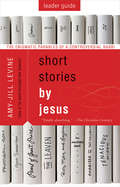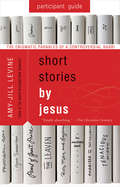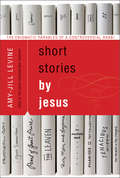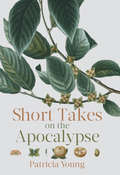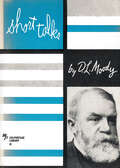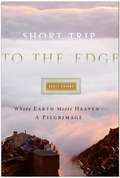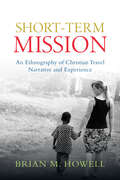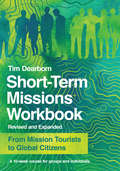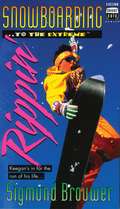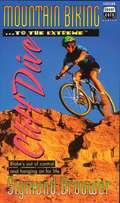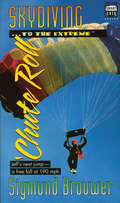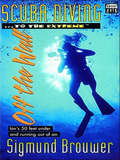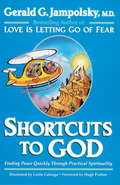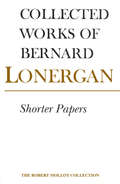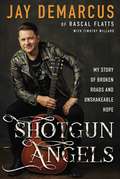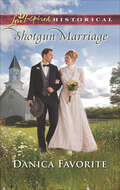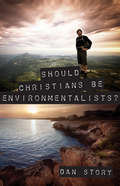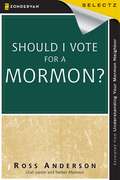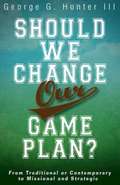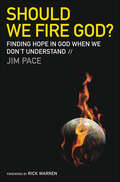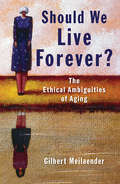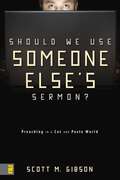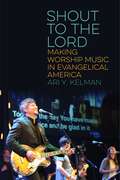- Table View
- List View
Short Stories by Jesus Leader Guide: The Enigmatic Parables of a Controversial Rabbi (Short Stories by Jesus)
by Amy-Jill LevineJesus was a skilled storyteller and perceptive teacher who used parables from everyday life to effectively convey his message and meaning. Life in first-century Palestine was very different from our world today, and many traditional interpretations of Jesus' stories ignore this disparity and have often allowed anti-Semitism and misogyny to color their perspectives.In Short Stories by Jesus, Amy-Jill Levine analyzes these "problems with parables" taking readers back in time to understand how their original Jewish audience understood them. With this revitalized understanding, she interprets these moving stories for the contemporary reader, showing how the parables are not just about Jesus, but are also about us—and when read rightly, still challenge and provoke us two thousand years later.The Leader Guide contains everything needed to guide a group through the six-week study including session plans, activities, and discussion questions, as well as multiple format options.
Short Stories by Jesus Participant Guide: The Enigmatic Parables of a Controversial Rabbi (Short Stories by Jesus)
by Amy-Jill LevineJesus was a skilled storyteller and perceptive teacher who used parables from everyday life to effectively convey his message and meaning. Life in first-century Palestine was very different from our world today, and many traditional interpretations of Jesus' stories ignore this disparity and have often allowed anti-Semitism and misogyny to color their perspectives.In this Bible study based on her Short Stories by Jesus, Amy-Jill Levine analyzes these "problems with parables" taking readers back in time to understand how their original Jewish audience understood them. With this revitalized understanding, she interprets these moving stories for the contemporary reader, showing how the parables are not just about Jesus, but are also about us—and when read rightly, still challenge and provoke us two thousand years later.This participant guide provides an introduction to the main text as well as further Scripture commentary and reflection questions.
Short Stories by Jesus: The Enigmatic Parables of a Controversial Rabbi (Short Stories By Jesus Ser.)
by Amy-Jill LevineJesus was a skilled storyteller and perceptive teacher who used images from everyday life to stir up interest in his message about the Kingdom of God. But life in first-century Galilee and Judea was very different from our world today, and many traditional interpretations of Jesus's stories not only ignore this difference, but also often import anti-Jewish and sexist views. As eminent Bible scholar Amy-Jill Levine writes in Short Stories by Jesus:Jesus was requiring that his disciples do more than listen; he was asking them to think as well. What makes the parables mysterious, or difficult, is that they challenge us to look into the hidden aspects of our own values, our own lives. They bring to the surface unasked questions, and they reveal the answers we have always known, but refuse to acknowledge. Religion has been defined as designed to comfort the afflicted and to afflict the comfortable. We do well to think of the parables of Jesus as doing the afflicting. Therefore, if we hear a parable and think, "I really like that" or, worse, fail to take any challenge, we are not listening well enough.In this wise, entertaining, and educational book, Levine explores Jesus's most popular parables, revealing their hidden depths, exposing their misinterpretations, and showing how they can still challenge and provoke us two thousand years later.
Short Takes on the Apocalypse
by Patricia YoungThe poems in this collection originated as a response to Elmore Leonard's "Ten Rules of Writing" and metamorphosed into poetic responses to quotations and epigraphs on a variety of subjects.
Short Talks (Colportage Library #91)
by Dwight L. MoodyIn his classic work Short Talks, D.L. Moody's earnestness and care for the spiritual health of his readers is evident as he emphasizes God's forgiveness of sin, fellowship with His people, offering of new life through His Son's sacrifice, and giving His people the Holy Spirit. Challenge yourself to better understand many matters of the Christian faith.
Short Talks (Colportage Library #91)
by Dwight L. MoodyIn his classic work Short Talks, D.L. Moody's earnestness and care for the spiritual health of his readers is evident as he emphasizes God's forgiveness of sin, fellowship with His people, offering of new life through His Son's sacrifice, and giving His people the Holy Spirit. Challenge yourself to better understand many matters of the Christian faith.
Short Trip to the Edge
by Scott CairnsWhile walking on the beach with his Labrador, poet and literature professor Scott Cairns ran headlong into his midlife crisis. A fairly common experience among men nearing the age of fifty, midlife crises are usually manifested in the form of sports cars and younger women; not so for this Baptist turned Eastern Orthodox. Cairns had a realization that as the advancement of his spiritual life was moving at a snail's pace, time was running out, and his crisis emerged in the form of a desperate need to seek out prayer. Told with wit and exquisite prose, Slow Pilgrim is the story of Scott's spiritual journey to the mystical island of Mt. Athos. With twenty monasteries and thirteen sketes scattered across its sloping terrain, the Holy Mountain was the perfect place for Scott to seek out a prayer father and to discover the stillness of the true prayer life. His narrative takes the reader from a beach in Virginia to the most holy Orthodox monasteries in the world to a monastery in Arizona and back again as Scott struggles to find his prayer path. His story includes accounts of the relationships he forges with several different monks and priests along the way, as well as life-long friendships he makes with other pilgrims.
Short-Term Mission: An Ethnography of Christian Travel Narrative and Experience
by Brian M. HowellOver the past few decades, short-term mission trips have exploded in popularity. With easy access to affordable air travel, millions of American Christians have journeyed internationally for ministry, service and evangelism. Short-term trips are praised for involving many in global mission but also critiqued for their limitations. Despite the diversity of destinations, certain universal commonalities emerge in how mission trip participants describe their experiences: "My eyes were opened to the world's needs." "They ministered to us more than we ministered to them." "It changed my life." Anthropologist Brian Howell explores the narrative shape of short-term mission (STM). Drawing on the anthropology of tourism and pilgrimage, he shows how STM combines these elements with Christian purposes of mission to create its own distinct narrative. He provides a careful historical survey of the development of STM and then offers an in-depth ethnographic study of a particular mission trip to the Dominican Republic. He explores how participants remember and interpret their experiences, and he unpacks the implications for how North American churches understand mission, grapple with poverty and relate to the larger global church. A groundbreaking book for all who want to understand how and why American Christians undertake short-term mission.
Short-Term Missions Workbook: From Mission Tourists to Global Citizens
by Tim Dearborna concise summary of crosscultural principleshelp in facing spiritual warfaretips on avoiding a tourist mentalityspiritual preparation through individual or group Bible study questions for individual reflection and group discussion
Shortcuts #1: Snowboarding to the Extreme
by Sigmund BrouwerKeegan, the best skier on the hill, ends up playing detective when he discovers that someone is trying to sabotage the ski team, and it looks like a pretty blonde snowboarder is involved.
Shortcuts #2: Mountain Biking to the Extreme
by Sigmund BrouwerBlake Coffey knows the mountain trails better than anyone. He practices harder than anyone. And nobody can pull the stunts he does. So winning the Summit Race seems to be a sure thing.until he finds a backpack of hundred-dollar bills along the trail during a practice run. Now it seems the sport he lives for just might kill him.
Shortcuts #3: Skydiving to the Extreme
by Sigmund BrouwerSkydiving--one mistake, and you fall like a piano.until, SPLAT! You're a blob of jam. Jeff Nichols works at a local flight school--just to pay for his skydiving. Then he hears of a plan to put his biggest rival into a 'chute roll, which he knows no skydiver has ever survived. But trying to stop it might put Jeff in an airplane at 10,000 feet--without his parachute.
Shortcuts #4: Scuba Diving to the Extreme
by Sigmund BrouwerScuba diving--there's a lot more to worry about than sharks! "I can't breathe!!!" Ian Hill spends his Florida summers helping his uncle run a dive shop. But just when he thinks it's going to be another boring summer hehind the counter, Ian hears that a recent storm has uncovered a pirate shipwreck hidden for years on the ocean floor. Soon Ian's slow summer at the scuba shop turns into a diver's nightmare.
Shortcuts to God
by Hugh Prather Gerald G. JampolskyMore than twenty years after the publication of LOVE IS LETTING GO OF FEAR, best-selling author Gerald Jampolsky brings us the highly anticipated sequel. In SHORTCUTS TO GOD, Dr. Jampolsky sheds light on the human longing to be closer to the mystical parts of our lives, and teaches us to abandon our fears and embrace honesty, forgiveness, and love. When asked why the sequel has been so long in coming, Dr. Jampolsky explained that learning about love can be a lifelong expedition-one that has continuous cycles of hardship, fulfillment, and revelation, each of which builds on the past to shape the self. Fortunately for the rest of us, Dr. Jampolsky has emerged from his own spiritual journey much the wiser, and ready to share the insights and revelations he's gleaned along the way. SHORTCUTS TO GOD will jump-start your journey to love and spirituality, whether you're just starting down the path or well on your way to enlightenment.From the Trade Paperback edition.
Shorter Papers: Volume 20
by Robert M. Doran SJ Bernard Lonergan Robert C. Croken H. Daniel MonsourAs a prolific scholar and theologian, Bernard Lonergan authored a significant amount of material aside from the works with which he is commonly associated. Shorter Papers is a collection of lesser-known items written by Lonergan over the course of his career. Together, they offer privileged access to the author's thought and work, as well as a glimpse at some of his most personal qualities. <P><P> The items in this volume extend from some of the earliest writings – the Blandyke Papers, for instance, which predates any of the materials represented in the Collected Works – to pieces written near the end of Lonergan's life. Organized chronologically, they give an impression of his development as a writer, his ever-strengthening religious commitment, and his role as teacher. As a sampling of pieces from the late 1920s to the early 1980s, Shorter Papers testifies to the cumulative impact of Lonergan's work, as well as to the amazing continuity that he maintained throughout his career as an author and intellectual.
Shotgun Angels: My Story of Broken Roads and Unshakeable Hope
by Jay DeMarcusMany celebrities are known to say how blessed they are, but when Rascal Flatts' Jay DeMarcus says it, the word takes on a completely different meaning. From his humble beginnings in Ohio to the spark of early fame in Nashville to a fair share of surprises and setbacks in between, he's learned firsthand that the blessing only comes through the broken road. And the only thing able to sustain a person along the way is hope.With no shortage of humor, heart, and off-the-cuff candor, Jay gives readers a backstage pass to the story behind the music and the musician. Along the way, you'll find the same constant source of strength that he has: hope that is powerful enough to hold you up through whatever twists, turns, or trials come your way.
Shotgun Marriage: The Cowboy's Baby Bond Want Ad Wedding Shotgun Marriage Mail Order Mix-up
by Danica FavoriteIn this inspirational historical, a couple forced to marry to avoid scandal learn how to love and be a family when they take in an orphan.Forced to wed to protect their reputations after being trapped overnight in a mine, Emma Jane and Jasper Jackson’s marriage is one in name only. Resenting the choices taken from him, Jasper’s determined not to lose his heart. But it’s not so easy to stay distanced from his new bride when a gang of bandits abducts them both. Other young women might be ecstatic to land Leadville’s wealthiest bachelor. But Emma Jane would rather have Jasper’s love than his family’s money. A true bond with her handsome husband seems impossible . . . until their ordeal leaves Emma Jane caring for an orphaned baby. In reach now is the one thing neither expected—the chance to turn a convenient marriage into a forever family.
Should Christians Be Environmentalists
by Dan StoryDid God instruct the human race to be His caretakers over nature? If so, is environmental exploitation disobedience to God? Is it true, as many critics claim, that Christianity is the root cause of today's environmental problems--or are all religions and cultures responsible? How should the church respond?Should Christians Be Environmentalists? systematically tackles these tough questions and more by exploring what the Bible says about the environment and our stewardship of creation. Looking at three dimensions of environmentalism as a movement, a Bible-based theology of nature, and the role the church has in environmental ethics, Dan Story examines each through a theological, apologetic, and practical lens.
Should I Vote for a Mormon?
by Ross AndersonMore than a belief system, Mormonism is a cultural identity that shapes the worldview, values and lifestyle of those involved in the Church of Jesus Christ of Latter Day Saints. In this digital short Ross Anderson helps Christians to understand Mormon life and culture, answers the senstive question "Are Mormons Christians?", and finally tackles whether a Christian, in good conscience, can vote for a Mormon.
Should We Change Our Game Plan?: From Traditional or Contemporary to Missional and Strategic
by George G. Hunter IIIMany of the most effective churches consist of some sort of combination of "traditional" and "contemporary." However, they are not simply "blended." In fact, much of what they do is beyond mere categorization of "traditional" and "contemporary." Instead, they are "missional" and "strategic" in their approach. Using sports metaphor, author George Hunter lays the groundwork for a new line of thinking, a new identity, in order to incite a quiet revolution.
Should We Fire God?: Finding Hope in God When We Don't Understand
by Jim PaceWhen the worst school shooting in history occurred, Pastor Jim Pace, a Virginia Tech alumnus, was front and center. Media, students, church members, and strangers asked him the same question: If God is loving, why doesn't He stop disasters before they start? Shoudl We Fire God is Jim's thoughtful, reasoned response to the idea that God isn't doing His job very well. In conversational, nonpreachy prose, Jim explains why God allows pain and devastation to occur -- and what the consequences would be if He didn't. And he leads readers to question: if we fire God -- who takes His place -- woefully imperfect humans? Jim uses real-life examples and his own battles with faith to develop readers' understanding of God, His true role in their lives, what they should do with doubt and fear, and what He feels when we ache. Richly informative and comforting, Shoudl We Fire God is a must-read for seekers everywhere.
Should We Live Forever?: The Ethical Ambiguities of Aging
by Gilbert MeilaenderIn Should We Live Forever? Christian ethicist Gilbert Meilaender puzzles over the implications of the medical advances that have lengthened the human life span, wrestling with what this quest for living longer means for our conception of living well and completely. As he points out in his introduction, "That we often desire, even greedily desire, longer life is clear; whether what we desire is truly desirable is harder to say."The six chapters of this book take multiple perspectives on issues surrounding aging and invite readers to consider whether "indefinitely more life" is something worth pursuing and, if humans are created for life with God, whether longer life will truly satisfy our underlying hunger.
Should We Use Someone Else's Sermon?: Preaching in a Cut-and-Paste World
by Scott M. GibsonWith easy access to sermons on the Internet, plus pressure to deliver the next sermon with little time to prepare, no wonder some pastors have resorted to plagiarizing other people's sermons, passing them off as their own. This growing epidemic has received coverage in the Wall Street Journal, on National Public Radio, and elsewhere. Some pastors have been caught in the act and dismissed from their churches. Is this fair? Is this stealing? How can you recognize it? How can it be prevented? This book not only helps explain the problem, but it also explores the ethical implications and gives advice on how to avoid it or deal with it if the problem surfaces in your church. It includes study questions at the end of chapters and a concluding case study.
Shout to the Lord: Making Worship Music in Evangelical America (North American Religions #13)
by Ari Y. KelmanHow music makes worship and how worship makes music in Evangelical churches Music is a nearly universal feature of congregational worship in American churches. Congregational singing is so ingrained in the experience of being at church that it is often misunderstood to be synonymous with worship. For those who assume responsibility for making music for congregational use, the relationship between music and worship is both promising and perilous – promise in the power of musical style and collective singing to facilitate worship, peril in the possibility that the experience of the music might eclipse the worship it was written to facilitate. As a result, those committed to making music for worship are constantly reminded of the paradox that they are writing songs for people who wish to express themselves, as directly as possible, to God. This book shines a new light on how people who make music for worship also make worship from music. Based on interviews with more than 75 songwriters, worship leaders, and music industry executives, Shout to the Lord maps the social dimensions of sacred practice, illuminating how the producers of worship music understand the role of songs as both vehicles for, and practices of, faith and identity. This book accounts for the human qualities of religious experience and the practice of worship, and it makes a compelling case for how – sometimes – faith comes by hearing.
Shout, Sister, Shout! The untold Story of Rock-and-Roll Trailblazer Sister Rosetta Tharpe
by Gayle F. WaldBiography of African American gospel and blues singer.
